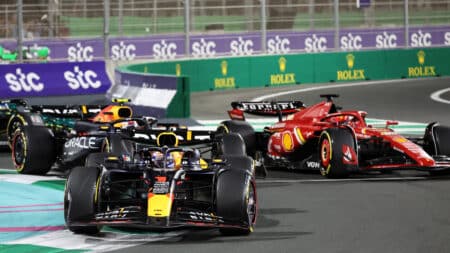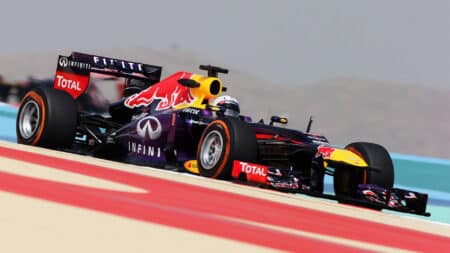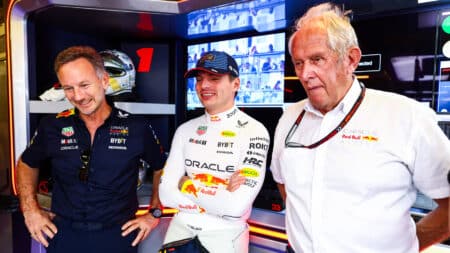
Which Red Bull will show up in Jeddah? - What to watch for at Saudi GP
Can Red Bull rebound from its poor Bahrain showing? And will it be Piastri or Norris leading McLaren's charge? Here's the five themes to watch for at the Saudi Arabian GP
I got an e-mail from a friend after he’d read the current magazine’s cover story about our utopian vision for a future F1. He pointed out that whichever way you attempted cost controls, teams would devise snake holes to stash hidden resources.
“They are snakes, remember,” he advised. Further advising that F1 should surrender on trying to control costs, he contended that his proposed solution would make it not matter from a sporting perspective what the difference in budgets was between teams: driver rotation.
It’s a chestnut that’s at least a decade old – Max Mosley being the first to suggest it as something suitably outrageous that the teams would never agree to, in that way allowing him to push through something else they didn’t find quite as unpalatable.
It remains an interesting idea – as a thought exercise, at least. But it’s a very divisive one. Teams in general dislike the idea but so do a lot of the fans, perhaps because it suggests just another layering sheen of gimmickry to those already fed up with DRS wings, etc.
But there is an undeniable pure logic to it: if each driver had, say, two races in each car over the season, the best driver would be world champion and the team with the best car would win the constructors’ title. In the meantime technical ingenuity could flourish.
But I recall once discussing the idea with Gil de Ferran, a driver that revelled in getting within the very fabric of his teams in Indycar, and he was appalled. “No man, that would just be so… so… simplistic,” and he almost spat that final word out.
“Part of your job as a driver, a major part of it, is to develop the team and the car around you. When you win, it’s vindication for everyone involved in that whole process. That process would just disappear with driver rotation. No. No!”
But Gil did spend his career in good, well-funded teams and did love the technical aspect of the game. Nelson Piquet would doubtless have felt the same in the 1980s had someone suggested he vacate his Gordon Murray Brabhams for all but a couple of races so he could take his turns in the various Arrows, Osellas, Tyrrells, etc.
But what about Pierluigi Martini, a driver who spent nine years in F1, mainly in Minardis, famously qualifying one on the front row at Phoenix 1990 and who over each season out-qualified every team-mate he ever had? How do you imagine he might have felt about getting his shot in the McLaren-Honda? And how fascinating would it have been to see what Ayrton Senna could have done with the Minardi?
It would require that the whole sport be restructured; teams could no longer form sponsorship bonds based around their drivers, the whole marketing platform would have to be re-thought, there would be problems with information transfer, of teams giving their technical secrets away. It’s vastly impractical, most teams would hate it and, as recalled, the fans did not embrace the idea when it was first suggested.

Pierluigi Martini: what could he have achieved?
That’s why we haven’t included it in our vision of the future. But it would be fascinating to hear what Motor Sport readers thought: would driver rotation be an appalling showbiz gimmick, perhaps even worse than all those inflicted upon the sport in recent years, just one more simplistic artifice for the benefit of the casual fan?
Is part of the whole appeal of F1 seeing a driver and team form a relationship, both technical and human, so that we forever associate Jim Clark with a green Lotus 25, Ronnie Peterson with a JPS Lotus 72, Niki Lauda with a Ferrari 312T, Alan Jones with a Williams FW07, Ayrton Senna with a series of dayglo and white McLarens?
Or would it finally make F1 a sport where the best driver always wins, putting right something that has always been wrong with it? Think how many world championships Stirling Moss would have had with this system in place…
More from Mark Hughes
The world according to Niki Lauda
Double-points logic becomes clear
The Villeneuves at Trois-Rivières

Can Red Bull rebound from its poor Bahrain showing? And will it be Piastri or Norris leading McLaren's charge? Here's the five themes to watch for at the Saudi Arabian GP

McLaren's breakthrough in a near-four-year-old ruleset shows F1 rules convergence is a myth – just like Sebastian Vettel, Red Bull and Renault did in 2013, writes Mark Hughes

Madrid finally has a consortium to build the new Formula 1 circuit that will host the 2026 Spanish GP

Helmut Marko caused a stir after the Bahrain GP with his worries that Max Verstappen could leave Red Bull early. But how real are those fears?